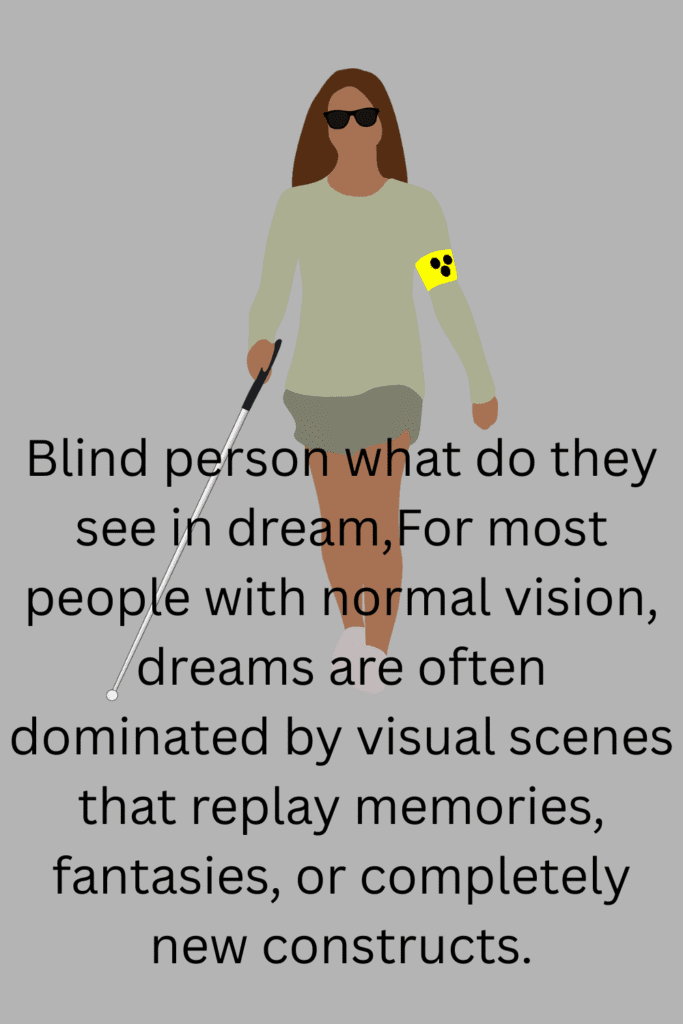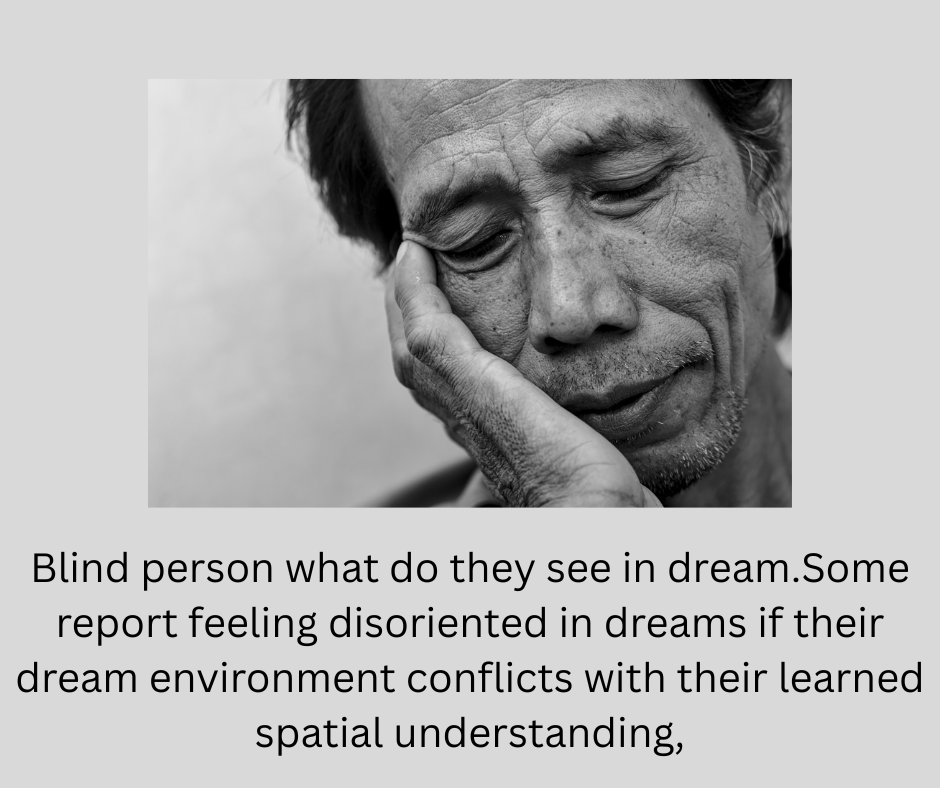Introduction
Blind person what do they see in dream Dreams are a universal human experience, often filled with vivid images, sounds, and emotions. But what about people who are born blind? If someone has never experienced sight in their waking life, what do they see in their dreams? Do their dreams contain images at all? Or are they entirely filled with different sensations?
This intriguing question opens a window into the fascinating world of sensory perception, brain function, and human consciousness. In this article, we’ll explore what happens in the dreams of those born without sight, how their dreams differ from sighted people, and what science and psychology reveal about this mysterious topic.

Table of Contents
Understanding Dream Experiences
Dreams typically involve a combination of sensory experiences: visual images, sounds, tastes, smells, touch, emotions, and even spatial awareness. Blind person what do they see in dream,For most people with normal vision, dreams are often dominated by visual scenes that replay memories, fantasies, or completely new constructs.
However, the nature of dreams is closely tied to what an individual experiences while awake. The brain draws on sensory input accumulated through life to form the dream world.
What Happens When Blind person what do they see in dream?
People born blind lack visual experience because their eyes or optic nerves do not transmit visual information to the brain, or the brain’s visual centers do not develop the ability to process images. This means their brain never creates visual memories or sensory impressions linked to sight.
What Do Blind person what do they see in dream Experience ?
Blind person what do they see in dream,Studies show that people who are congenitally blind do not “see” visual images in their dreams, but their dreams are rich in other sensory modalities, such as:
- Sound: Voices, music, environmental noises
- Touch: Textures, pressure, temperature
- Smell: Familiar scents like flowers, food, or surroundings
- Taste: Flavors from eating or drinking in dreams
- Emotions: Joy, fear, excitement, sadness
- Spatial Awareness and Movement: The sense of moving through space, interacting with objects, or navigating places
Thus, the dream world for someone born blind is a vivid multi sensory experience — just without any visual content.
How Do Their Dreams Differ from Sighted People?
Sighted individuals tend to report visual dreams around 80% to 90% of the time, while people born blind rarely or never experience visual images in dreams. Blind person what do they see in dream,Instead, they often describe:

- More intense sounds and tactile sensations
- Richer emotional content
• A better awareness of where your body is and how it moves (kin esthetic sense)
Interestingly, people who lose their sight later in life may still see visual images in their dreams for years or decades after blindness onset because their brains retain those visual memories.
Scientific Research on Blind People’s Dreams
- A multitude of studies have been carried out to explore the impact of blindness on the content of dreams:
- One key finding is that blind individuals’ dreams rely heavily on the senses they use most in waking life.
- A study published in Sleep Medicine (2003) found that congenitally blind people’s dreams include more sounds, smells, and tactile experiences than sighted people.
- Conversely, those who lost sight later tend to have dreams with visual imagery but less vivid over time.
- Brain imaging studies also reveal that the visual cortex in congenitally blind people is often repurposed to process touch and hearing, showing the brain’s incredible adaptability.
What Does This Tell Us About the Nature of Dreams?
The experience of people born blind in dreaming highlights several important truths about dreams:
- Dreams Reflect Sensory Experience
Dreams are formed by the knowledge and experiences the brain gathers while awake. The brain cannot generate visual dreams without visual stimuli. - Dreams Are Multi sensory
Vision is only one of our senses. Dreams can be filled with sounds, feelings, scents, flavors, and emotions. - The Brain Is Highly Plastic
The brain adapts to the loss of one sense by enhancing others, both in waking life and dreaming.
How Do Blind People Describe Their Dreams?
Many blind individuals describe their dreams as “real,” emotionally powerful, and full of familiar sensations. They may dream about conversations, exploring places by touch, smelling flowers, or feeling the wind.
Blind person what do they see in dream.Some report feeling disoriented in dreams if their dream environment conflicts with their learned spatial understanding, while others describe dreams that help them rehearse daily activities or solve problems.
Can Blind People Have Nightmares?
Yes, people who are blind from birth can experience nightmares and other emotional dream states just like sighted people. Nightmares often involve threatening or stressful scenarios, and in blind individuals, these fears might be conveyed through sound, touch, or other sensory cues rather than visual horror images.
The Emotional Power of Dreams without Sight
Since dreams for blind people rely on other senses, emotional and social aspects of dreams can be even more pronounced. Blind person what do they see in dream,The way people interact, communicate, and experience feelings in dreams can be deeply meaningful, offering insight into their inner world.
Practical Implications and Dream Studies
Understanding the dream world of blind individuals has implications in several areas:
- Therapy and Mental Health: Dream analysis can aid in understanding subconscious fears, desires, and mental health challenges.
- Sleep Research: Studying sensory differences in dreams improves knowledge about brain function and plasticity.
- Technology and Accessibility: Insights may inspire innovations in sensory technology or virtual reality for the blind.
Conclusion
So, if a person is born blind, what do they see in their dreams? The simple answer is they don’t see images as sighted people do. Instead, their dreams are composed of sounds, touch, smells, tastes, emotions, and spatial awareness.
This remarkable adaptation shows the brain’s power to create meaningful, multi sensory dream experiences even without vision. Blind person what do they see in dream,It also reminds us that dreams are as diverse as human experience itself, shaped by the unique way each person perceives and interacts with the world.
Whether you have perfect vision or no vision at all, dreams offer a profound glimpse into the workings of the mind — a universal language beyond sight.